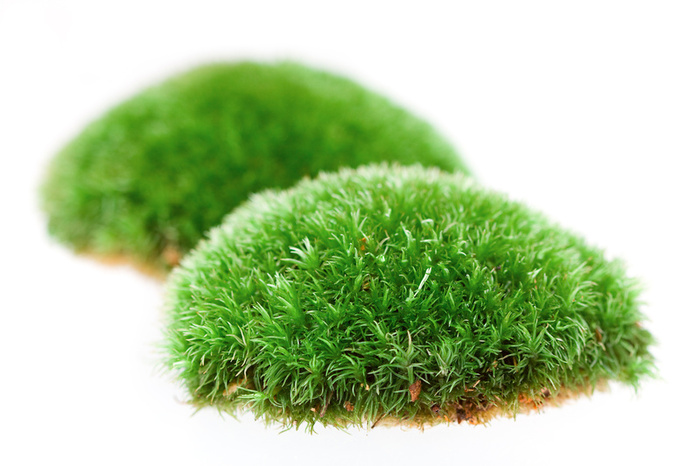
MOSSES.
THEY are harmless little dwarfs that live among the big plants—sometimes the size of a needle's eye; again, as long as your finger. Maiden hair moss spreads over the turf in a soft cushion, with golden head and feathers, wearing a golden crown.
The star-moss bears fruit-like golden bells; and another, of yellowish-green, droops over great forest trees. A hundred kinds grow on the housetops, by the mountain side, and in the woods and moors. The roots are the frailest. A single one could not exist by itself. It dries up in the wind, withers in the sun, and is crushed, even by a light bird step. But Providence kindly places the mosses in families; so—being of a spongy nature—they flourish, and even in a drought grow rich by absorbing dew together. Mosses have been called the "good spirits of the forest." They nurse the shelterless in cold winter, taking into their warm beds acorns and all the nuts. The butterfly, beetle,
and spider find shelter, and the bear sometimes sleeps away his winter there. Mosses watch over all the seeds, while they drink and germinate; and protect every living thing near them. How grateful to the weary traveler on the mountain is a sight of mosses, that show him a soft bed to rest upon.
How delightful to children, in a summer's ramble, to play among the green tufts, and take them home —woven into beautiful garlands! And so the mosses tell us a pretty story—how the feeblest of little beings, without strength of its own, by sweetly uniting with kindred spirits, may live and thrive, and finally become a great power upon the earth.
—Christian Intelligencer.
TELLING an untruth is like leaving the highway and going into a tangled forest. You know not how long it will take you to get back, or how much you will suffer from the thorns and briers in the wild woods. How much better it is to tell the truth at all times.
LICHENS.
THE book of nature is full of beautiful lessons, and if we will only look carefully, we may find them at every step.
A few weeks ago, while riding in the country, I saw many illustrations of God's love and kind-ness. But coming suddenly upon an old log house, long ago deserted, I thought, surely here is nothing to remind one of God's love! The walls were old and decaying, and the broken doors, through which, long ago had passed the burial or the bridal train, were now creaking dismally on their rusty hinges. The whole house looked forsaken indeed.
But on a nearer view we found the house to be covered over with beautiful green moss and gray lichens. They had crept over the desolate ruins and settled affectionately into every crevice and corner. They kept off the piercing rays of the sun in summer; and when winter came with its ice and snow, the old house still had friends, which neither cold winds nor storms could drive away.
Then I thought, "God's love is like the lichens.
When we grow weak and weary, friends leave or forsake us, and life seems shorn of all its beauty, then is His love still over us." And I thanked God for the sweet lesson as we rode slowly onward.
Let us take courage. He will not leave or forsake us in sorrow or in death.
M. E. G.
God, who in his mercy gives the flowers each summer to his world, leaves no' life to be all winter; but as he "sends rain on the just and on the unjust," so to every one there comes some help when it is most needed, some color, some blossom of happiness or of hope.